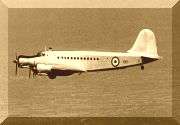Fiat G.12
The Fiat G.12 was an Italian transport aircraft of World War II.
| Fiat G.12 | |
|---|---|
 | |
| Fiat G.12 | |
| Role | Civil airliner & military transport |
| Manufacturer | Fiat |
| Designer | Giuseppe Gabrielli |
| First flight | 15 October 1940 |
| Introduction | 1941 |
| Retired | 1956[1] |
| Primary users | Regia Aeronautica Luftwaffe Royal Hungarian Air Force |
| Produced | 1941-1944 |
| Number built | 104[2] |
Design and development
The G.12 was an all-metal low-wing cantilever personnel transport aircraft. It had three radial engines, one mounted on the nose and the other two in wing-mounted nacelles. The engines drove three-blade feathering metal propellers. The mainwheels of its landing gear retracted into the nacelles; the tailwheel was fixed. The flight deck and cabin were fully enclosed. Access was via a portside access door aft of the wing.
The G.12 was designed as a civil aircraft, but served mainly in military roles during the war. Only a limited number were built, some as late as 1944, after the Italian armistice. The G.12 inspired the postwar G.212 "Flying Classroom", the last Italian three-engine transporter. It had a crew of four.
Variants
- G.12C
- 14-passenger transport aircraft, powered by three 574 kW (770 hp) Fiat A.74 R.C.42 radial engines.
- G.12 Gondar
- Long-range cargo transport aircraft.
- G.12GA
- Long-range transport aircraft, fitted with extra fuel tanks. Three built.
- G.12RT
- Special long-range version, built to fly between Rome and Tokyo. One built.
- G.12RTbis
- One built.
- G.12T
- Troop and cargo transport aircraft.
- G.12CA
- 18-passenger commercial airliner, powered by three Alfa Romeo 128 radial engines.
- G.12L
- 22-passenger commercial airliner.
- G.12LA
- 22-passenger commercial airliner, powered by three Alfa Romeo 128 radial engines.
- G.12LB
- 22-passenger commercial airliner, powered by three 604 kW (810 hp) Bristol Pegasus 48 radial engines.
- G.12LP
- 22-passenger commercial airliner, powered by three 793 kW (1,065 hp) Pratt & Whitney R-1830-S1C3-G Twin Wasp radial engines.
Operators
Military operators
- Royal Hungarian Air Force operated 12 aircraft
- Italian Air Force operated some aircraft until 1956[1]
Civil operators
- Ali Flotti Riunite[4]
- Alitalia-Linee Aeree Italiane[4]
Specifications
Data from World Encyclopedia of Military Aircraft [5]
General characteristics
- Crew: 4
- Capacity: 14 troops or 24 civilians
- Length: 20.1 m (65 ft 11 in)
- Wingspan: 28.6 m (93 ft 10 in)
- Height: 4.9 m (16 ft 1 in)
- Wing area: 113 m2 (1,220 sq ft) [6]
- Empty weight: 9,420 kg (20,768 lb) [6]
- Gross weight: 15,000 kg (33,069 lb)
- Powerplant: 3 × Fiat A.74 R.C.42 14-cylinder air-cooled radial piston engines, 574 kW (770 hp) each
- Propellers: 3-bladed constant-speed propellers
Performance
- Maximum speed: 390 km/h (240 mph, 210 kn) at 5,000 m (16,404 ft)
- Cruise speed: 303 km/h (188 mph, 164 kn) [6]
- Range: 2,300 km (1,400 mi, 1,200 nmi)
- Service ceiling: 8,500 m (27,900 ft)
Armament
- Guns: 2 × 7.7 mm (.303 in) Breda-SAFAT machine guns
See also
Related development
Aircraft of comparable role, configuration and era
- Junkers Ju 52
- Douglas DC-3
- SM.79 Sparviero
- Savoia-Marchetti SM.81
Related lists
References
- aeroflight
- Fiat G.12
- Stroud 1966, p. 417.
- Stroud 1966, p. 418.
- Angelucci 1981, p.349.
- Stroud 1994, p.68.
- Angelucci, Enzo The World Encyclopedia of Military Aircraft. London:Jane's Publishing, 1981. ISBN 0-7106-0148-4.
- Angelucci, Enzo The World Encyclopedia of Military Aircraft, London, 1987.
- Stroud, John. European Transport Aircraft since 1910. London: Putnam, 1966.
- Stroud, John. "Post War Propliners : Fiat G.12 and G.212". Aeroplane Monthly. Volume 23 No. 1, January 1994. London: IPC. Page 64-68.